Common menu bar links
Breadcrumb Trail
ARCHIVED - RCMP External Review Committee - Report
 This page has been archived.
This page has been archived.
Archived Content
Information identified as archived on the Web is for reference, research or recordkeeping purposes. It has not been altered or updated after the date of archiving. Web pages that are archived on the Web are not subject to the Government of Canada Web Standards. As per the Communications Policy of the Government of Canada, you can request alternate formats on the "Contact Us" page.
Section II: Analysis of Program Activities by Strategic Outcome
Strategic Outcome
The RCMP External Review Committee aims to positively influence the manner in which labour relations issues are addressed within the RCMP.
In order to work towards achieving its Strategic Outcome, the ERC carries on two program activities: Program Activity 1 Independent and impartial case review; and Program Activity 2 Outreach and information dissemination.
In fiscal year 2009-10, the Program Activity Internal Services was appended to the ERC's Program Activity Architecture. As a result of its experience in attempting to meet the reporting requirements, the ERC determined that the uniquely small size of the organization made the reporting of this program activity particularly inaccurate. The related expenditures cannot be reliably apportioned between program activities without an inordinate expenditure of resources. This justification was provided to Treasury Board who in turn agreed with the ERC's assertion. As such, the ERC has been granted an exemption until the end of the 2010-11 fiscal year from reporting on financial commitments to Internal Services as a separate program activity.
Program Activity 1: Independent and impartial case review
Program Activity Description
The ERC can dispose of matters referred to the ERC by the Royal Canadian Mounted Police (RCMP) either on the basis of the material in the record or following a hearing. In conducting its review of matters referred to it, the ERC attempts to achieve timeliness and quality in its recommendations, and a balance amongst the many complex and different interests involved. It strives to ensure that the principles of administrative and labour law are respected and the remedial approach indicated by the Royal Canadian Mounted Police Act is followed. In each case, the ERC must consider the public interest and ensure that members of the RCMP are treated in a fair and equitable manner.
| Planned Spending | Total Authorities | Actual Spending |
|---|---|---|
| $1,449 | $1,892 | $1,463 |
| Planned | Actual | Difference |
|---|---|---|
| 6 | 5 | 1 |
| Expected Results |
Performance Indicators |
Targets | Performance Status |
|---|---|---|---|
| Parties and RCMP Commissioner are provided with an independent review of the dispute to facilitate transparent and accountable dispute resolution. | Percentage of cases where findings and recommendations are issued. | 100% | Met All |
| A body of findings and recommendations is created to assist RCMP Level 1 Adjudicators, concerned parties, RCMP Commissioner and staff representatives to interpret legislation, regulations and policy. | Number of times legislative, regulatory or policy interpretative guidance provided in findings and recommendations. | As required | Met all |
| Identification of areas for legislative, regulatory or policy change/clarification. | Number of recommendations for change/clarification provided in findings and recommendations. | As required | Somewhat met |
Performance Summary and Analysis of Program Activity
Case Review
The ERC concludes matters referred to it by the RCMP either on the basis of the material in the record or following a hearing. In conducting its reviews, the ERC attempts to achieve timeliness and quality in its analysis and recommendations, and an equitable balance between all of the interested parties. It relies on the principles of administrative and labour law and it respects the remedial approach indicated by the RCMP Act. In each case, the ERC considers the public interest along with the members' interest in fair and equitable treatment.
The statutory mandate of the ERC in the RCMP Act is case review and it is in this respect that Program Activity 1 supports Priority 1.
Referrals
Sixteen case files were referred to the ERC in 2010-11: 15 grievances and 1 disciplinary appeal. The ERC received no referrals of discharge and demotion appeals this year.
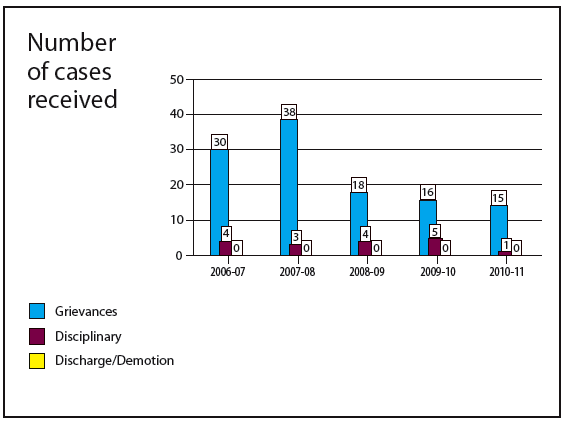
Cases Completed and Recommendations Issued
The ERC completed 23 cases in 2010-11: 15 findings and recommendations were issued regarding grievances and eight were issued regarding disciplinary appeals. No cases were withdrawn before the ERC could issue its findings and recommendations. The ERC did not issue any findings and recommendations in discharge or demotion cases this year.
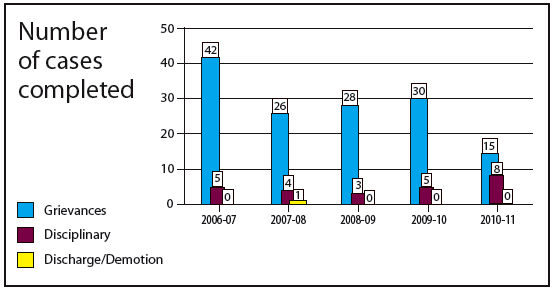
Grievance Reviews
The chart below shows the distribution of this year's grievance recommendations by subject matter.
In the last few years, travel, harassment, and relocation issues accounted for a significant portion of grievance reviews. In 2010-11, travel and harassment issues combined represented two-thirds of all the grievance recommendations issued.
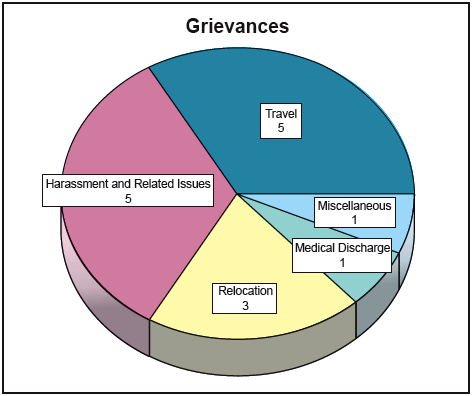
Disciplinary Appeals
This year, the ERC reviewed and made recommendations in eight disciplinary appeals. Six were initiated by a member. Three involved a sanction consisting of an order to resign within 14 days or be dismissed from the Force. The other three involved a forfeiture of pay and reprimand. The ERC recommended that four appeals be dismissed, that one be allowed and that one be allowed in part.
Two disciplinary appeals were initiated by the Appropriate Officer. The ERC recommended that both of these appeals be dismissed.
Processing
For grievances, the ERC's objective is to issue its findings and recommendations within three months of the case being referred to it. For discipline and discharge and demotion cases, it strives for a standard of six months. These service standards are not currently being met. The ERC continues to pursue avenues for a permanent resource allocation that will allow it to reach and sustain an acceptable review rate.
At the start of 2010-11, 46 grievances and appeals were pending before the ERC. At the fiscal year end of 2010-11, there were 39 cases before the ERC for review. They were distributed as follows:
- 34 pending grievances;
- 5 pending disciplinary appeals; and
- 0 pending discharge and demotion appeals.
This reduction in the number of pending cases signals a move toward a shorter delay for cases before the ERC. If this trend continues, the ERC will reach the point where its turn-around rate will be reasonable. However if the relatively small number of cases that reach the ERC ever surges, the delays will again increase significantly. This occurred one year when the ERC received 30 cases more than it received historically and it created lengthy delays in the processing of subsequent cases.
Other Activities
In addition to its case review function, the ERC must meet every statutory obligation required of all departments in the Public Service. The ERC is fully committed to delivering on its mandate, while ensuring compliance with legislation and policy.
The ERC's workload includes disproportionately significant reporting and corporate requirements. The ERC has few staff members who are involved in the collection, analysis and reporting of its corporate data to the central agencies that oversee the various aspects of management. As a result, these staff members are called upon to become the ERC's subject matter experts for a number of different areas including procurement, finance, human resources and knowledge management. These staff members assume many roles to address corporate management demands in order to meet the same reporting requirements of large departments and agencies. The ERC also uses a variety of external consultants to ensure that it thoroughly meets all of its obligations. Given the ERC's small size and budget, these reporting pressures take combined human and financial resources away from the case review process.
Lessons Learned
The events of this past year served to remind the staff and management of the ERC that uncertainty can be alleviated through immediate revisions to operations and related expenditures. The ERC's plans allowed it to scale back at a moment's notice as events transpired and to re-organize its priorities. It was of prime importance that the ERC keep in close communication with parties interested in its mandate and funding. The ERC gained excellent advantage from its reputation for faithfully exercising its mandate and managing its operations responsibly. Its good rapport with partners served to secure good support for contingency planning.
Program Activity 2: Outreach and information dissemination
Program Activity Description
The ERC ensures that its finding and recommendations in each case are clearly explained for the parities and the RCMP Commissioner. Summaries of the findings and recommendations in each case, as well as articles of interest on the role of the ERC, relevant legal principles and information on related issues, are distributed widely. Communication and outreach tools include: a quarterly publication (Communiqué) including the most recent case summaries, updates, and legal principles; a website with timely inclusion of publications and cases summaries; the annual report and other government accountability documents; and presentations, meeting, training and other outreach activities.
| Planned Spending | Total Authorities | Actual Spending |
|---|---|---|
| 362 | 479 | 321 |
| Planned | Actual | Difference |
|---|---|---|
| 2 | 2 | 0 |
| Expected Results |
Performance Indicators |
Targets | Performance Status |
|---|---|---|---|
| Make available information to the public on labour relations issues within the RCMP to support accountability and transparency. | Subscription levels for quarterly Communiqué; subscription levels for annual report; website traffic; volume of requests for information. | Ongoing | Exceeded |
| Increase awareness of labour relations issues and resolutions within RCMP Policy. | Website access statistics; subscription and distribution data; number of requests for information; number of outreach events. | Ongoing | Exceeded |
Performance Summary and Analysis of Program Activity
The ERC strives to make timely information accessible and achieved both its paper and electronic distribution targets as well as its digital posting targets. Subscriptions levels have remained constant and website traffic has increased more than anticipated. As a result, the utility and the credibility of its website holdings is progressively becoming better recognized and indicate greater accessibility and increased awareness.
Summaries of the ERC's findings and recommendations in each case, as well as articles of interest, relevant legal principles and information on related issues, are distributed widely. Communication and outreach tools include: a quarterly publication (Communiqué); a website with inclusion of publications and case summaries; the annual report; and presentations, meetings, offered training and other outreach activities.
This part of the ERC's work is dedicated to Program Activity 2, and it directly supports Priority 2.
Requests for Information
The ERC also responds to formal and informal requests for information. In 2010-11, the ERC received a total of 116 requests. On average, the ERC provided an answer to each request within three days. Over two-thirds of the requests came from the RCMP itself. Members of the public were the second largest group of requesters.
The graphs below illustrate the general categories of requests received and their sources. Several requests were straightforward and requesters were provided with a timely response or were re-directed to the appropriate office. However, other requests were complicated and required more time and effort for a complete and accurate response. By far, the median response time was one day, indicating that a smaller number of complex inquiries were significantly time-consuming.
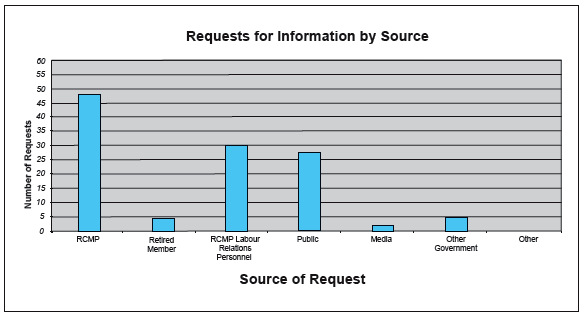
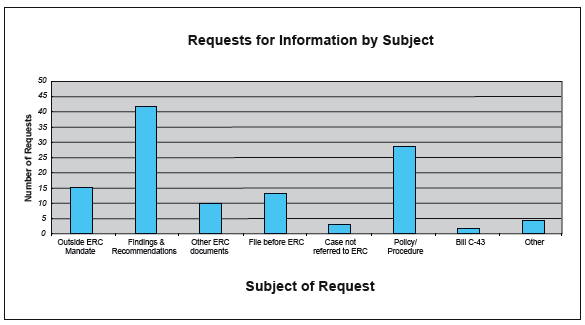
Lessons Learned
The events of this past year served to remind the staff and management of the ERC that uncertainty can be alleviated through immediate revisions to operations and related expenditures. The ERC's plans allowed it to scale back at a moment's notice as events transpired and to re-organize its priorities. It was of prime importance that the ERC keep in close communication with parties interested in its mandate and funding. The ERC gained excellent advantage from its reputation for faithfully exercising its mandate and managing its operations responsibly. Its good rapport with partners served to secure good support for contingency planning.
